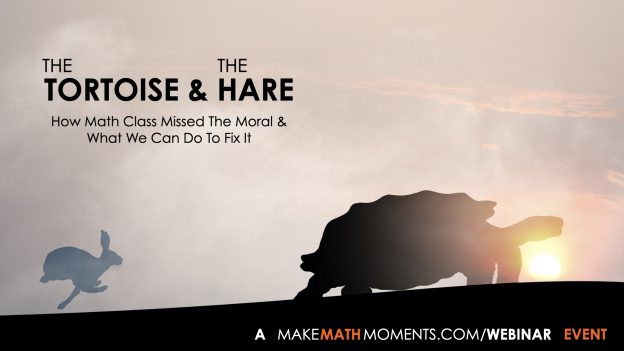
The Tortoise & Hare
Join Kyle & Jon as they explore the two systems for thinking in the brain and how mathematics education often only serves one. They’ll share the practical classroom lessons and routines that not only help you find the right balance in your mathematics program, but will also help your students to define an identity that they value in your math class.
When you think back to moments from your mathematical learning experience, what comes to mind?
Do your memories tend to feel more like the recalling of facts, steps, and procedures or do they feel more like the process of problem solving where you were routinely left to think deeply through a productive struggle?
Why does it seem that our experiences from math class tend to be a case of either/or?
When exploring new approaches to teaching and learning mathematics, we are often confronted with very absolute views that pit one extreme against the other. Ideas such as direct instruction vs. inquiry lessons, grades vs. gradeless assessment practices, homework vs. no homework, or hands-on collaborative tasks vs. independent worksheet practice; regardless of what pedagogical approach you wish to explore, it’s a sure bet that you’ll find someone out there who believes it is poor practice.
Join Kyle & Jon as they explore the two systems for thinking in the brain and how mathematics education often only serves one. They’ll share the practical classroom lessons and routines that not only help you find the right balance in your mathematics program, but will also help your students to define an identity that they value in your math class.
What You’ll Learn:
- What we need to cultivate SLOW & FAST thinkers in math class and how to do it;
- Why math class rewards extroverts and how to structure our math class to engage ALL students on an introvert / extrovert spectrum;
- How to teach with problem based lessons that are accessible to all learners;
- How to help students conceptually understand their basic math facts.
Dive into this live webinar replay course that will help you bring balance to your math class.
Certificate:
A certificate of completion will be unlocked once each module and lesson in this course is marked complete.
Length of course:
Approximately 1.5 hours of video lesson content with another recommended 3 hours of reflection, planning and implementing.
Who can access this course?
Make Math Moments Academy Members.
Join now and get 30 days free or save by selecting an annual subscription.
30-day Money-Back Guarantee and you can cancel anytime.
PLUS Academy Members can access over 10 other courses covering topics like Teaching Math Remotely, Assessment, Math EdTech Tools, Conceptualizing the Fundamentals of Mathematics, Spiralling and many more! See all of the Academy Courses here.
Want to learn more about what other benefits you receive as an Academy Member? Click here to learn more.
Course Content



